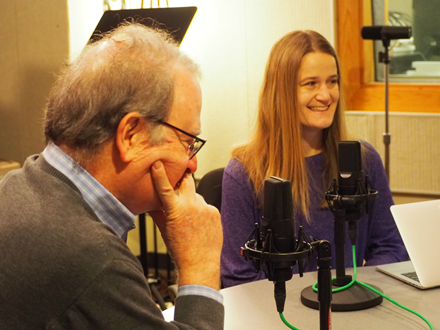After three sluggish years, Michigan’s economy could perk up in 2020 with relaxed tariffs, an end to the General Motors’ strike and a bipartisan North American Free Trade Agreement, Institute for Public Policy and Social Research podcasters are predicting.
In Congress and in Michigan’s Legislature, 2020 may bring improved roadways, brakes on prescription drug costs, a blast-off to a new national  space force and the dawn of legalized sports betting in the state, podcasters projected.
space force and the dawn of legalized sports betting in the state, podcasters projected.
Michigan’s Gov. Gretchen Whitmer, entering her second year, campaigned for new road construction taxes but ran into legislative opposition.
“Don’t give up the roads just yet,” cautioned Matt Grossmann, political scientist and IPPSR Director. He leads IPPSR’s State of the State podcast with Charles Ballard, Director of IPPSR’s State of the State Survey, and Associate IPPSR Director Arnold Weinfeld.
Sarah Reckhow, associate professor of political science, was the podcast guest. She shared research showing that nonprofit organizations and foundations are contributing – perhaps too much -- to governing in financially troubled communities like Flint and Detroit.
Click here to list to IPPSR’s latest State of the State Podcast.
Nonprofit organizations have traditionally aided the work of financially strapped communities, but are now taking on public sector responsibilities or even paying for jobs in local government, said Reckhow, who serves as Graduate Program Director in MSU’s Department of Political Science.
“They're very close partners with city government. I would say it's kind of a co-dependent relationship. The cities depend on the philanthropies and the nonprofits for financial support …. The nonprofits and philanthropies gain more influence, in large part because of this close partnership,” she said.
“We expect nonprofits and philanthropy to step in when there's an emergency to provide aid. That's something that happens throughout the United States,” she explained.
Yet, philanthropy that helps cities pay for essential goods and services – like water services in Flint or transportation in Detroit – can erode or discourage community decision-making over the long term, Reckhow concluded.
At the same time, Michigan’s current property tax policies limit the ability of communities to raise taxes, even as their economy recovers. The result: struggling communities with retreating economic development and declining populations are facing cuts in state revenue sharing, and a downward spiral in property values.
“It's just not a good situation,” Reckhow said. “It speaks to broader issues about how we finance local government in Michigan.”
While many communities are working to diversify their economies and revenue sources, the need for improved streets, sidewalks, schools, and lighting continues to grow, she said.
Delayed infrastructure investment increases its cost, especially for communities losing population. Fewer people shoulder a greater share of community costs, she said. “It's like being a homeowner. If you don't replace your roof on a regular basis or do other kinds of maintenance, those costs get worse and worse and worse.”
See Reckhow’s research here in “Governing without Government: Nonprofit Governance in Detroit and Flint” published in Urban Affairs Review and in the Washington Post Monkey Cage blog "Detroit and Flint keep relying on private money to solve public problems. Why?"
The State of the State Podcast is produced by WKAR and available on online and atcommercial radio sites. Listen in (IPPSR website)
Podcasters also looked ahead toward a combination of state and national events that could boost Michigan and the Midwest’s 2020 jobs and manufacturing outlook.
2019 offered a flat to no-growth year in Michigan, Indiana, Ohio and Wisconsin. “I hope we can have some pushes to nudge the economy forward in the next few months,” Ballard said.
Few legislative initiatives were offered during 2019, Grossmann said. “It has been a lackluster year in politics as well. We have graduated from stalemate in the state to agreement on the status quo. Both sides have made a lot of noise. But in terms of actual policy change, we haven’t seen much.”
While voters have traditionally given an incumbent president credit for good economic times, that tie appears to be loosening, Grossmann noted. “There’s less of a potential effect when we’re perceiving the economy through our partisan lenses.”